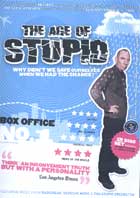
The Age of Stupid 2008
Distributed by Bullfrog Films, PO Box 149, Oley, PA 19547; 800-543-FROG (3764)
Producer n/a
Directed by Franny Armstrong
DVD, color, 89 min.
College - Adult
Environmental Studies
Date Entered: 10/07/2010
Reviewed by Gary Handman, University of California BerkeleyThe year is 2055. An ecological apocalypse has decimated the planet. Somewhere in the Arctic Circle, 800 kilometers north of Norway, a lone structure—an enormous high-tech obelisk—contains the last evidence of cultural and biological life on earth: thousands of zettabytes of digitized print; a veritable ark’s worth of embalmed animal life; the contents of the great art museums of the world; acres of artifacts, a comprehensive inventory of global material culture. The Archivist, a gaunt and haunted man, addresses us through his computer screen, calling up sundry news footage to demonstrate how centuries of environmental short-sightedness, along with prevailing human greed and stupidity, have led to the eco-Armageddon. Dolefully, he explains that it’s a fate which could have been avoided. So far, so good at least cinematically speaking: cool-looking CGI futurescapes and Pete Postlethwaite's transfixingly ravaged face to gaze at.
Unfortunately, from a documentary standpoint, things quickly fall apart after this promising introduction. The Archivist hopscotches between the stories of seven individuals from different parts of the world: Jeh Wadia, an ambitious self-made entrepreneur in India trying to get an independent, low-cost airline off the ground; Al DuVernay, an oil company engineer in New Orleans who lost everything in the wake of Katrina, but decided to stay behind to help others; 82-year-okd Frenchman Fernand Pareau, a mountain climber and guide who has witnessed the shrinking of glaciers over the years and the incursion of highways and roads into his once-pristine countryside; Jamila and Adnan, two Iraqi children whose family is torn apart by the war; Englishman Piers Guy who does battle with the resistant local villagers in the course of trying to get a wind turbine farm established in the countryside; and Layefa Malemi, a Nigerian woman struggles with poverty made worse by corrupt governmental and oil company colusions. Although these individual stories are engaging on their own (someone should make a separate documentary about Waddia and his airline), collectively they really don't speak all that compelling or forcefully to the film's central themes, which seem to be global warming and environmental irresponsibility.
The filmmakers often appear to be shaking a wrathful fist at a panoply of irresponsible human activities—war, capitalist greed, environmental myopia—and in doing so they frequently veer seriously off course. The sequences about the Iraqi children and the critique of American involvement in the war, for example, seem completely misplaced. Similarly, while the sequences about the Nigerian woman point out the political and economic crimes of Big Oil in developing countries, they have little, if anything, to say about the global environmental crisis, per se. In all of these sequences, there's a tendency toward superficial analysis and the use of media bites and threadbare editorial devices. (There's actually an appearance by a cigar chomping, dollar-vested Capitalist cartoon right out of the New Masses, circa 1930). Having the Archivist periodically channel surf through one-second newsclips doesn't help matters much; there's little more than alarm conveyed.
Perhaps unintentionally, there's also more than a little mixed message that comes through in some of the invidual sequences. The filmmakers seem to imply that Jeh, the airline entrepreneur, in putting more petro-guzzling planes in the air is part of the ecological problem. Yet, his stated intent in starting his business is to help India's poor by providing cheap flights and jobs. What are we to make of him? Similarly, Layefa Malemi tells us that her goal is to work her way out of poverty in order to enjoy the fruits of material culture—the very same consumer products that the Age of Stupid repeatedly derides over the course of it's 80 minute run. What are we to think of her? Is SHE in danger of becoming part of Stupid, too? Al DuVernay, the ex-oil company guy, seems to lament the profligate use of oil—he obviously respects oil as a resource—considerably more than our continuing reliance on pretroleum our steadfast refusal to search for sustainable alternatives. How does HE fit into this picture? In general, The Age of Stupid, while obviously well-intentioned and passionate about its subject(s) has neither the focus, nor the compelling evidence required to effectively tackle a problem as complex as global warming and energy policy, and it adds little to the growing body of documentaries on these subjects. Better to watch Inconvenient Truth a second time.